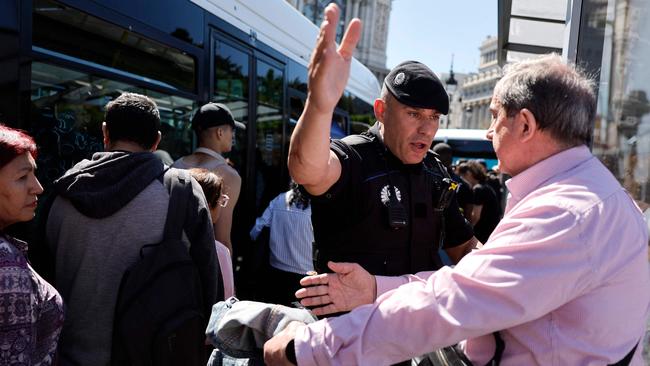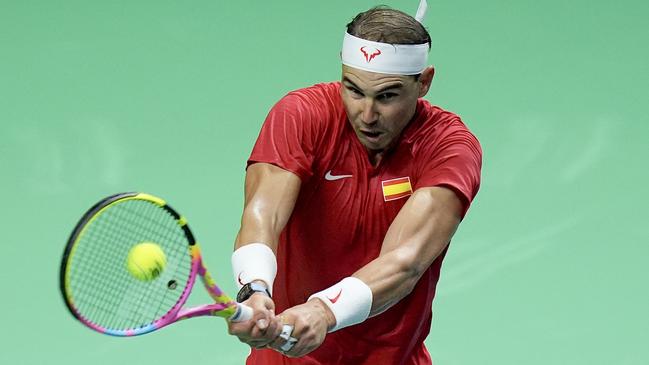Vikki Campion: Import hot tennis players from Spain, not a blueprint to run Australia
Spain – which orchestrated a devastating two-nation blackout, is dependent on mass immigration, and owes more than $1.76 trillion – is the gold standard for Labor, writes Vikki Campion.
News
Don't miss out on the headlines from News. Followed categories will be added to My News.
If you had to choose any country in the world to copy policy from, would it be the one that just orchestrated a devastating two-nation blackout, is dependent on mass immigration, and owes more than $1.76 trillion with no hope of paying it back? Apparently, yes.
This is the gold standard for Labor, or so it seems, as so many of its policies seem to be borrowed from Spain’s socialist catastrophe.
Copycat policy No.1
Only days after Spain boasted of record renewables in the grid, similar to the 82 per cent Labor is targeting for Australia, the power went out due to an “atmospheric phenomenon”.
If the judgment of net zero’s success, which Spain has been hurtling towards, is a total blackout of the Iberian Peninsula then it is a spectacular result.
At home, we are told a story where Labor tries to frame intermittent power as “reliable renewables” when the reality is that Spain was forced to deploy 30,000 police officers to maintain public order and prevent security incidents in the dark.

Crowds were left without cash or mobile phone coverage, trains were stranded in rural fields, and planes grounded as they returned to a candlelit medieval era.
But our energy policy is not all we are taking from socialist Spain.
Copycat policy no.2
Labor has successfully conducted a campaign surpassing a death duty tax. But instead of a tax on something you have not sold and not earnt, it proposes a brave new world of paying tax on unrealised capital gains on super. After working for years on how to crack into the $4.2 trillion super nest egg, it now has it. It uses the same narrative as intermittent power and, bizarrely, Spain: This is just to punish the bad ones.
It opens up the concept of taxing people on just having possession of an asset. It breaks the glass for getting hold of your superannuation money to pay off government debt, which is $1 trillion.
Those with a lot of money will reorganise their affairs to avoid it. They will take the money they used to invest in adventurous ways, such as reopening tin mines in Emmaville, into lazy investments, such as buying a big new house, or one for their kids and grandkids, because the primary domicile is capital tax gains free on sale.
So get ready for the rush of funds from building new businesses in Australia into existing houses.
Spain is one of just three countries in the world with such a tax. Other countries ditched it because it reduces the investment environment to a low-risk and unproductive area while punishing people who are asset-rich but cash-poor.
New ideas are high risk, but if they work, they give a large capital gain. It’s the trade-off for taking the risk. Now the government says if you take the risk and win, we will take the profit. Even if you don’t sell it, just owning it is enough to tax you.

Software under development by a programmer in Newtown is only possible thanks to the investor using his self-managed super fund. If it is a success, Dr Chalmers takes 30 per cent of its value on the books – that is, real cash that has to be paid even though they haven’t sold their share.
So what is the point of taking the risk? Just pour it into your primary residence.
And for people on the land, their farm is an intergenerational asset with a code signed in blood. It will never be sold, but passed on; it will mean taxing the home they have no intention of selling.
Taxing the property they had no intention to sell will force people to borrow from a bank, so debt builds, or they are forced to sell to corporates or overseas buyers. Then, ask why your groceries keep going up due to the great centralisation of food production. Right now, there are 17,000 farms in self-managed super funds, and 3500 of them will be in the firing line of being valued at over $3m and need to pay 30 per cent on an unrealised gain as soon as enacted.
Copycat policy no.3
Let the people pour into your country and rely on immigration to fuel the economy. Unless immigrants come in with houses in their backpacks, it becomes a massive strain on housing, hospitals and schools.

What’s sad about this is Labor has never lied about these policies. It has been upfront but, with a lazy media more focused on ephemeral targets, no one is aware of systemic issues of everything from our power grid to our superannuation.
Spain is a country from which we should import hot tennis players such as Rafael Nadal, not a blueprint to run Australia.
IN A BIG COUNTRY, REGIONAL DWELLERS CUT OFF FROM LOCAL MPS
It’s one thing to carve electorates based on population, but have we reached the point where our electorates are so big in regional Australia that the most disadvantaged people are not being fairly represented?
Regional electorates have been gradually increasing in size with each redistribution, and our rural communities struggle to meet the required electoral quotas while the population continues to grow on the coast.
Parkes, contested by Nationals candidate Jamie Chaffey, now covers a staggering 406,755sq km.

It is bigger than Germany (349,390sq km), New Zealand (264,537sq km), Italy (295,717sq km), and Japan (364,485sq km).
He must represent 20 local government areas in two time zones, and by the time he returns home on Saturday will have clocked 36,000km in his HiLux while knocking on 24,000 doors.
In contrast, the Prime Minister’s seat of Grayndler measures only 34sq km covering just four LGAs. Wentworth (31sq km) and Griffith (57sq km) are also among the smallest electorates. How does one of the 109,000 electors in Parkes have equal the same power of franchise of their vote as the PM’s constituents in the smallest seat when their electorate is more than 10,000 times bigger?
The list of countries that Parkes is larger than far exceeds the list of nations it is geographically smaller than, adjoining the border with Queensland and South Australia.
But it pales in comparison to Durack in Western Australia or Lingiari, which takes in basically everything in the Northern Territory except Darwin. Surely there should be an equivalence. Why do we disenfranchise the most basic right – access to political representation?
As regional seats get larger and there are fewer of them, people’s rights in regional areas are only getting smaller.
LIFTER
The 50 energy professionals, engineers, scientists, economists and environmentalists who put their name to a letter calling for energy reality to bring down our bills.
LEANER
Labor jumping the shark to claim Peter Dutton would build a nuclear power plant in suburban Brisbane.
More Coverage
Originally published as Vikki Campion: Import hot tennis players from Spain, not a blueprint to run Australia





